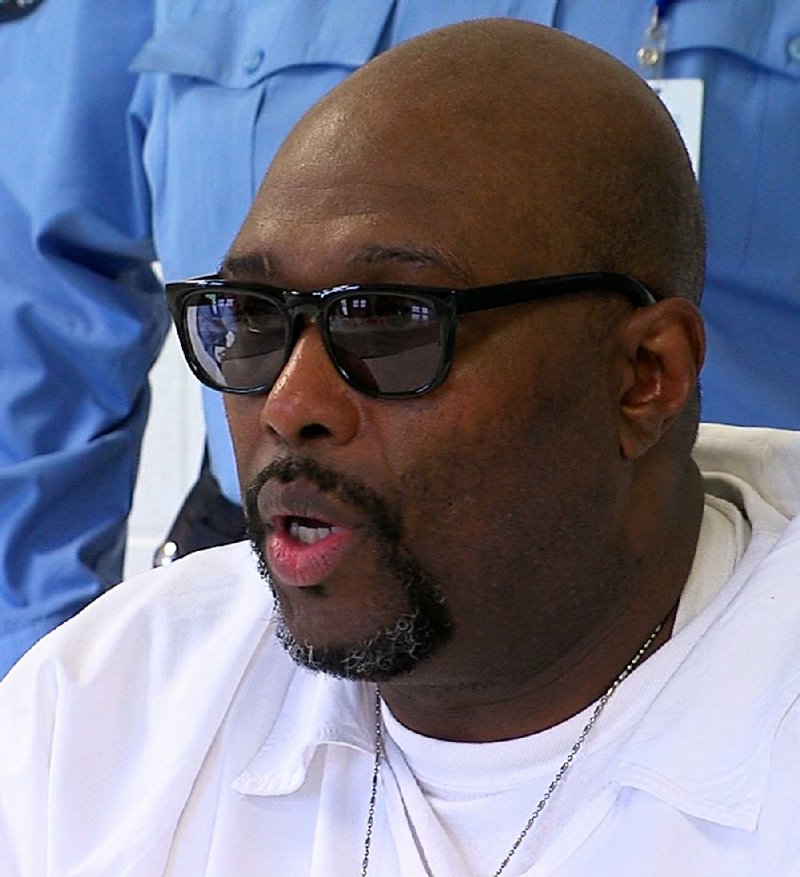The Arkansas Supreme Court on Thursday denied a death-row inmate's appeal for new DNA testing on evidence from a decades-old slaying in De Queen, shutting the door on an appeal that saved the inmate, Stacey Johnson, from a scheduled execution in 2017.
Johnson, who has spent a quarter-century in prison for the 1993 killing of Carol Heath, has argued for years that untested evidence in the case could implicate another suspect, possibly Heath's now-deceased ex-boyfriend. When he faced a pending execution date in April 2017, Johnson received legal support from the Innocence Project in New York, and a stay from the Arkansas Supreme Court allowing the courts to reconsider his case.
But in a 5-2 decision on Thursday, the justices ruled that sufficient evidence already supports Johnson's conviction, regardless of what further testing might show.
"The presence of another male's DNA could not significantly advance Johnson's claim of innocence in light of the remaining evidence," Justice Shawn Womack wrote for the majority. "It simply cannot explain away the DNA evidence directly linking Johnson to both crime scenes: Johnson's saliva on the partially smoked cigarette in the pocket of the bloody green shirt at the roadside park and his hairs discovered on and around Heath's body."
Womack also pointed to, as further evidence of Johnson's guilt, testimony by a jailhouse informant and Johnson's stepmother tying him to Heath's apartment the night of the killing, as well as a confession Johnson allegedly uttered to a police officer upon being arrested in New Mexico. Womack's opinion was joined by Chief Justice Dan Kemp and Justices Rhonda Wood and Courtney Hudson. Justice Karen Baker wrote a concurring opinion.
The evidence that Johnson sought to have tested included "Caucasian" hairs found near Heath's body and a second location where bloody clothes were dropped; swabs from a rape kit; and other articles found at both the slaying and drop location.
Justices Josephine "Jo" Hart and Robin Wynne each wrote separate dissents. In a dissent nearly three times as long as the majority opinion, Hart panned the majority's conclusions as "hyperbole and a hand wave," and cast doubt on much of the evidence linking Johnson to the crime scenes.
Testing further evidence from those locations, Hart wrote, would not have guaranteed Johnson's release or even a new trial. Instead, she said, testing could study the "very real possibility" that someone else killed Heath.
"Perhaps those opposing Johnson's proposed testing are simply anxious about what it could possibly reveal -- that another conviction of a black man in the 1990s was attributable to investigative failures and bias, and not to actual guilt," Hart wrote.
The rebuke from Hart was strong enough that Womack offered a response to his colleague's assertions in his own opinion.
"Race has nothing to do with the legal question in this case," Womack wrote. "We likewise object to the dissent's assertion that law enforcement officers 'manufactured' the chain of custody and 'swapp[ed] in' critical evidence. Such undeserved and unsubstantiated attacks undermine the public's trust in the integrity of our criminal justice system."
Johnson's case was orally argued before the high court on the first day of its fall term, in September. Thursday's decision comes as the justices are preparing to break for the holidays.
By denying Johnson's request for further testing, the Supreme Court also cleared the way for the state to begin again the process of scheduling his execution. However, the Arkansas Division of Correction lacks the drugs needed to conduct lethal injections.
A spokeswoman from the attorney general's office said in a statement Thursday that Attorney General Leslie Rutledge is reviewing the decision to determine further steps in "carrying out justice for the victim's family."
Arkansas last carried out executions in April 2017, when Johnson was one of eight men scheduled to die by lethal injection over a two-week period. Four of those executions were carried out, including that of another prisoner represented by the Innocence Project, Ledell Lee.
In a statement on Thursday, Innocence Project spokesman Juan Martinez said, "No one should be executed when DNA could prove innocence, especially in this case where potentially probative evidence from the crime scene has never even been submitted for DNA testing despite multiple requests."
Martinez said the nonprofit group would continue to seek DNA testing in Johnson's case through the courts. Whether the group appeals Thursday's decision to the U.S. Supreme Court, or files a new case in federal court, remains to be determined, Martinez said.
For now, Johnson remains incarcerated on Death Row at the Varner Supermax prison, which is a short drive from the state's execution chamber at the Cummins Unit.
Metro on 12/13/2019
